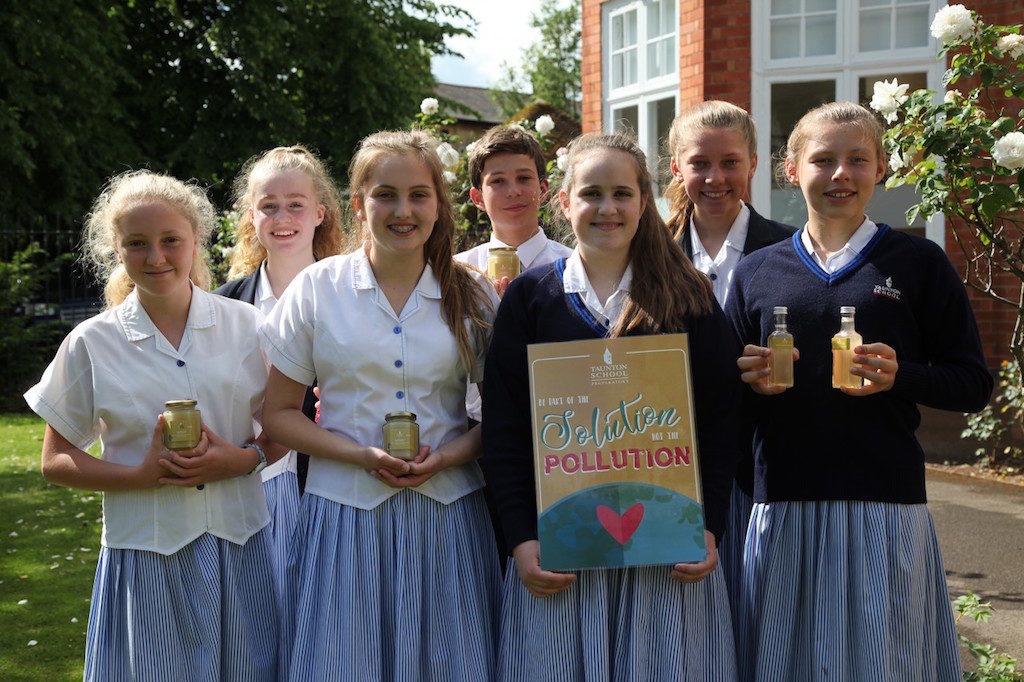Schools Go Green: Summer Sparks Pupil Focus on Sustainability
This post may contain affiliate links. Learn more
From building beehives to ditching their gadgets, schools go green this summer to do their bit for the environment.
Taunton School Harvest Honey To Help The Bees

One of every three bites of food that we eat relies on bee pollination. Therefore, after working on a project with the theme of ‘sustainable locally grown food’, it is not surprising that the Year 7 and 8 pupils at Taunton Prep decided they would like to build their own beehives to help the environment and produce their own honey.
Earlier this year, pupils built beehives in their own time using the school DT facilities, and now the hives are fully populated on a site near to Taunton School. The new ‘beekeeping club’ oversees and teaches students about the lifecycle of bees and their importance to farming and the environment and adds to the list of the school’s sustainability projects.
With help from teachers, they have just spun their first honey and cut honeycomb, selling their first jars at the recent school summer fair. The profits they made will buy beekeeping suits to educate more young people about the importance of bees. The money raised will also support their other eco-projects, such as the upkeep of their existing orchard from which they have produced their own apple juice and cider vinegar, and maintenance of their bird boxes, which they have built and situated around the school trees.
Eco Club Co-ordinator and Science teacher Tom Raven said: ‘Making these beehives is part of a school eco initiative to show pupils the benefits of sourcing local produce to help reduce carbon footprints.’
Putney High School Bring Nature Into The Classroom

Due to open in winter 2020, Putney High School will soon have a new Science, Music, Drama and Debating centre. As part of the project, they undertook a study into the school’s green infrastructure which included the first ever education-based study into Biophilic Design (monitoring the effect on air quality and student wellbeing of bringing nature into the classroom).
Putney’s four month Biophilic Classroom study demonstrated how – by incorporating elements of nature into the classroom – you can improve air quality and wellbeing, increase creativity and productivity.
Three classrooms were adapted: the first – an Advanced Mathematics Classroom with a large array of indoor plants, the second, an English Literature classroom, with a full scale visual representation of a forest, and the third, a Psychology seminar room left unaltered. The rooms were then monitored for air quality and atmosphere, as well as student behaviour, concentration levels and feelings of wellbeing. The findings showed how lessons became more calm, relaxed and focused in the more natural environments, with students engaged at the highest academic levels.
As more schools go green, Putney lead the way in integrating the outdoor world into education. The new centre will add to the school’s ecological learning strategy, combining ecological benefits with education. Already, Putney High School has outdoor classrooms and, more recently, a Junior Science Garden where young pupils can learn more about plant culture and crop productivity.
Cumnor House Celebrate Green Week

In light of the growing awareness on the impact we have on the environment, Cumnor House Sussex hosted its first ‘Green Week’ in an attempt to inform, demystify and present positive, viable suggestions for practical action. The school’s sustainability project included a range of parent and cross-curricular activities and was launched by an evening talk hosted by the well-known TV presenter and newsreader and Save the Children Ambassador, Natasha Kaplinsky.
Cumnor House Sussex was privileged to welcome a range of speakers to the school including Adam Frost, Director at Generation Investment Management, Mark Jankovich, CEO of Delphis, the UK’s premier eco-cleaning product product and Diana Uprichard and Mica Lamb from clothing and alterations company DOLLY, who is raising awareness of the true cost of our clothes. The speakers discussed current global ecological and societal challenges, their implications for our lives, and what we can do to combat them.
Inspired by the speakers, the school community supported a number of parent-led activities across Green Week. This included a voluntary clothes swap tent that took look at the environmental and societal impacts of the fashion industry, a plastic pledge to shop without buying single use plastics and the ‘School Run Challenge’, encouraging greater car sharing to help cut down on carbon emissions. Additionally, the school challenged children from Reception to Year 8 to take the ‘Night Without Light Challenge’. Meaning pupils had to ditch their electrical gadgets for a week, to raise money for the week’s chosen charity, SolarAid.
The hope is that striving for sustainability will be an everlasting challenge for the children and parents and make more schools go green.
Hawthorns School Pupils Turn Single-Use Plastic into Something Fantastic

Pupils from The Hawthorns School in Bletchingley, Surrey, worked with local artist Pippa Ward to create a piece of art highlighting the issues caused by single use plastics.
Children and their families collected plastic bottle tops, and led by the Eco Team pupils, over the course of a day children from across the School threaded these onto fishing line, which was subsequently attached to the pipe.
The sight of the torrent of bottle tops that seem to be gushing out of the pipe creates a very visual reminder of the plastics that drain into our rivers and seas. Its presence will ensure that the dialogue about single use plastics continues for years to come.
Headmaster, Adrian Floyd, commented, ‘Here at The Hawthorns we are very conscious of the impact we as a school have on the environment. As part of our sustainability programme, The Hawthorns School is committed to becoming “Zero Waste to Landfill” next year.’
READ MORE: International Sustainable Schools Built to Save the World
